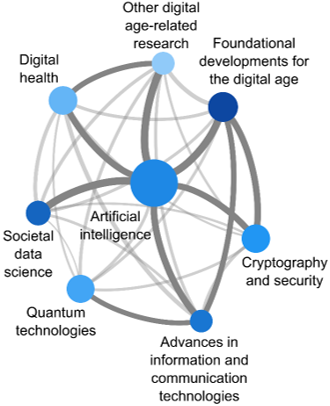Watching this video you are accepting Youtube cookies policy
The undeniable impact of digital technology on society has prompted the EU to develop a digital strategy aimed at leveraging this transformation for the benefit of individuals and businesses. This strategy focuses on unlocking the growth potential of the digital realm and designing governance systems that prioritise the well-being of individuals.
Several ERC grantees are at the forefront of digital innovation, and their research often leads to pioneering digital solutions. Notably, 757 projects supported by the ERC under the H2020 framework programme, contribute to policy areas related to ‘A Europe fit for the digital age’, with a total funding of €1.4 billion. Additionally, these projects involve 771 researchers and their teams located across 22 EU Member States, 4 Associated countries, and 2 non-EU/ACs.
Scientific synergies
The impact of digital technology on people's lives is diverse, encompassing areas such as digital health, cryptography, quantum technology, and artificial intelligence. The following analysis highlights eight research domains, depicted by blue circles, that align with these policies. The size of each circle corresponds to the number of ERC projects relevant to each domain. The strength of the connections between policy areas is depicted by the thickness of the arcs, which is proportional to the number of shared scientific fields.

Methodological developments
When looking at the impact of ERC-funded research on the progress of scientific methods, a significant advancement can be observed in the field of computational modeling, with a particular emphasis on simulations involving artificial intelligence and complex systems. Other noteworthy methodological developments include theoretical and mathematical methods with a focus on digital approaches, as well as validation, demonstration, and prototyping with a specific emphasis on digital advancements and applications. These methodological developments contribute to the selected areas aligned with the digital age.
A selection of relevant research
- Stefan Mangard’s team working on SOPHIA aim to establish the scientific foundation for executing software securely in the presence of physical attacks and already discovered two new security vulnerabilities in computer processors, named Meltdown and Spectre, allowing unauthorised external access to personal data
- Tamar Makin’s EmbodiedTech project already proved human brain can repurpose neurons to represent and control artificial limbs with the ultimate goal of finding the necessary conditions for the brain to recognise artificial limbs following an amputation
- Tamed Cancer is a pioneering project led by Levente Kovács aiming at improving personalized therapies by developing robust algorithms. This breakthrough concept could revitalize cancer treatment by calculating optimal drug dosages
- Ariadna Quattoni’s INTERACT will develop new interactive learning algorithms to address sentences in text of speech that is often complex and compositional
- CIRCUS aims at providing a comprehensive approach to cybersecurity and focuses on the Transport Layer Security protocol. Karthik Bhargavan and his team were able to identify its flaws and improve it to ensure digital security using downgrade cyber attacks simulations

